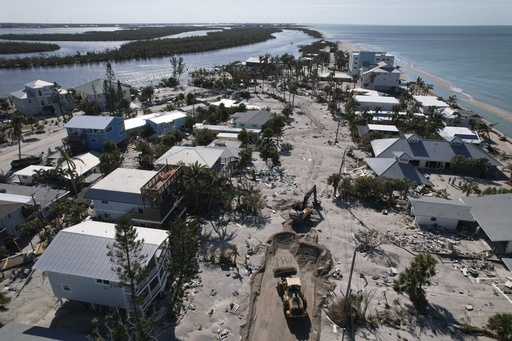
BRADENTON BEACH, Fla. — The onset of the “snowbird” season in Florida is right around the corner, but many beach areas along the Gulf Coast, known for being among the best in the country, remain closed due to the destruction wrought by Hurricane Milton just a fortnight ago.
In the upscale district of St. Armands Circle in Sarasota, numerous shops and eateries experienced severe flooding due to the back-to-back impact of Hurricanes Milton and Helene. Furthermore, the primary performing arts venue in Sarasota has been shuttered until January as repairs are underway due to significant damage. The aftermath has left debris cluttering roadways across the Gulf Coast.
Hurricane Milton, which struck Sarasota County as a Category 3 storm, caused extensive damage to one of the areas favored by snowbirds—seasonal residents who flock to Florida from colder regions during the winter. The hurricane inundated homes with sand, drove water inland, and resulted in massive financial losses, estimated to be in the tens of billions of dollars, covered predominantly by private insurance.
Construction contractor Larry West urged travelers to steer clear of the affected areas for now, emphasizing the necessity of allowing local residents and recovery crews to work efficiently without extra hindrance. “Give this area time. Don’t come here. It doesn’t help when you get people in the way,” he stated, as he put in long hours clearing out 4-foot sand deposits from a condominium on Manasota Key, approximately 32 miles south of Sarasota.
Conversely, in Clearwater—more than 55 miles north of Sarasota—Mayor Bruce Rector has been receiving inquiries from as far as Canada, with people keen to know when it would be appropriate to return. “I told them, ‘Today.’ It’s not going to be perfect, but you’ll still have a familiar experience here,” Rector remarked at a recent meeting of the Pinellas County Tourist Development Council.
Shawn Kaleta, a major property owner on Anna Maria Island, located about 20 miles north of Sarasota, is optimistic about the upcoming season, noting a surge in rental property reservations compared to the previous year. In Florida, with its 23 million residents, approximately 1.5 million seasonal residents visit annually, and a significant portion of them hails from Canada.
Evan Rachkovsky, the communications director for the Canadian Snowbird Association, reported no cancellations among members despite home damages, although some individuals are postponing their trips until conditions improve. “Most of our members are still planning to head south as usual,” he mentioned.
Already, some snowbirds have made their way back south, reuniting with friends in their favorite activities like pickleball and tennis, even if some of their neighbors’ residences remain uninhabitable. Given Sarasota’s reputation for a vibrant performing arts scene, a notable contingent of snowbirds is drawn to the arts. The Van Wezel performing arts hall, which accommodates major local performances, has also been closed due to Hurricane Milton, with shows canceled until the start of the new year.
In recent years, many snowbirds have opted to delay their return to Florida until after hurricane season concludes in late November. Consequently, several performing arts organizations are adjusting the start of their seasons, as Richard Russell, the general director of Sarasota Opera, noted that around 40% of their subscribers are seasonal residents. “If people delay their return due to storm occurrences in late October, that could become a new trend,” Russell suggested.
Additionally, the unfortunate circumstances along the Gulf Coast have opened doors for opportunistic vacation home owners elsewhere. Gary Sacks advertised his two-bedroom condo in North Myrtle Beach, South Carolina, on a Facebook group designed for Florida snowbirds within a week of Milton’s impact, seeking out those whose plans were disrupted by hurricanes. He has not responded to interview requests.
Jim Lenz, a 96-year-old resident of Ohio who winters in the central Florida retirement community known as The Villages, expressed that the recent storms might cause some snowbirds to reconsider their winter plans, especially those who are older. “Some may give up on it. Others may decide, ‘We just can’t stand the cold up here, and we are going down,’” Lenz commented.
On the other hand, snowbirds like Joe Singer are resolute, indicating that the increasing frequency and severity of storms will not deter them. Singer, who has enjoyed five winters in Parkland, Florida, instead of his native New Jersey, mentioned that many snowbirds are adjusting by securing homes further inland or on elevated ground, as well as investing in generators. “The winter months are ‘like a mini-heaven,’” he remarked, appreciating the absence of snow-related chores like scraping ice off windshields or shoveling sidewalks. He concluded by expressing how much he enjoys the pleasant winter conditions.
